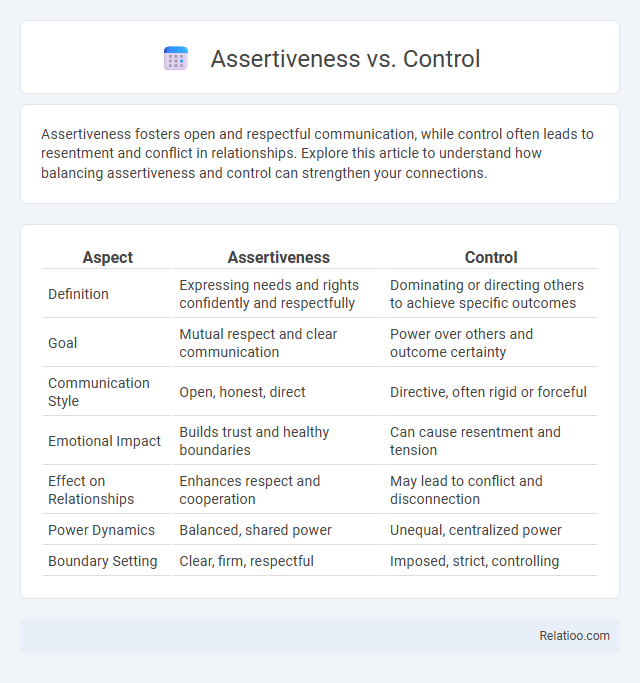Assertiveness fosters open and respectful communication, while control often leads to resentment and conflict in relationships. Explore this article to understand how balancing assertiveness and control can strengthen your connections.
Table of Comparison
| Aspect | Assertiveness | Control |
|---|---|---|
| Definition | Expressing needs and rights confidently and respectfully | Dominating or directing others to achieve specific outcomes |
| Goal | Mutual respect and clear communication | Power over others and outcome certainty |
| Communication Style | Open, honest, direct | Directive, often rigid or forceful |
| Emotional Impact | Builds trust and healthy boundaries | Can cause resentment and tension |
| Effect on Relationships | Enhances respect and cooperation | May lead to conflict and disconnection |
| Power Dynamics | Balanced, shared power | Unequal, centralized power |
| Boundary Setting | Clear, firm, respectful | Imposed, strict, controlling |
Understanding Assertiveness vs Control
Assertiveness involves expressing thoughts and feelings confidently while respecting others' rights, fostering healthy communication and collaboration. Control centers on exerting authority or dominance to influence outcomes, often limiting others' autonomy and creating resistance. Understanding assertiveness versus control highlights the balance between self-expression and respect for others, promoting effective interaction without coercion.
Defining Assertiveness in Communication
Assertiveness in communication involves expressing your thoughts, feelings, and needs openly and honestly while respecting others' rights. Unlike control, which seeks to dominate or manipulate the conversation, assertiveness fosters mutual understanding and clear boundaries without aggression. Your ability to be assertive ensures effective dialogue, balancing confidence with empathy for collaborative outcomes.
The Nature of Control in Relationships
The Nature of Control in relationships often revolves around the desire to influence outcomes and behaviors, creating a dynamic where power balance is crucial. Assertiveness allows You to express your needs and boundaries clearly without overpowering others, fostering mutual respect and cooperation. Excessive control, however, can lead to tension and resentment, undermining trust and the emotional safety essential for healthy connections.
Key Differences Between Assertiveness and Control
Assertiveness involves expressing Your thoughts, feelings, and needs openly and respectfully, fostering clear communication and mutual respect. Control, by contrast, seeks to dominate or manage situations and people, often disregarding others' perspectives or autonomy. Understanding these key differences helps You balance confidence with empathy, avoiding aggression or manipulation in interactions.
Psychological Roots of Assertiveness and Control
Assertiveness stems from a healthy sense of self-esteem and the psychological need for autonomy, enabling individuals to express thoughts and needs confidently without infringing on others' rights. Control behavior often originates from anxiety, fear of uncertainty, or past experiences where loss of control led to negative outcomes, driving a desire to dominate or manage situations excessively. Understanding these psychological roots helps distinguish assertiveness as a balanced expression of self versus control as a reaction to vulnerability or insecurity.
Signs of Assertive Behavior
Assertive behavior is characterized by clear, confident communication and respectful expression of your thoughts and feelings without aggression or passivity. Key signs include maintaining eye contact, using a firm but calm tone, and setting personal boundaries while considering others' perspectives. Developing assertiveness enhances your ability to manage interactions effectively, distinguishing it from controlling behavior that imposes will on others.
Recognizing Controlling Tendencies
Recognizing controlling tendencies involves identifying behaviors that limit others' autonomy and impose rigid rules or expectations, often manifesting as micromanagement or resistance to feedback. Assertiveness promotes clear, respectful communication of one's needs without undermining others' freedom, whereas control seeks to dominate outcomes and suppress dissent. Distinguishing assertiveness from control helps maintain healthy boundaries and fosters collaborative environments.
Impact on Personal and Professional Relationships
Assertiveness promotes clear communication and respect, fostering trust and collaboration in both personal and professional relationships. Control can lead to resistance and conflict, undermining trust and worsening relational dynamics. Your balanced assertiveness enhances mutual understanding and productivity without the negative effects associated with excessive control.
Building Assertiveness Without Being Controlling
Building assertiveness without being controlling involves expressing your thoughts and needs clearly while respecting others' boundaries and opinions. Effective assertiveness requires balancing confidence with empathy, ensuring communication is direct yet considerate to prevent dominance or manipulation. Cultivating this skill enhances interpersonal relationships by fostering mutual respect and collaborative problem-solving.
Strategies for Balancing Assertiveness and Control
Effective strategies for balancing assertiveness and control involve recognizing the distinction between respectful self-expression and dominating behavior. Techniques such as active listening, setting clear boundaries, and practicing empathy enhance assertiveness without infringing on others' autonomy. Incorporating feedback loops and emotional intelligence supports maintaining a collaborative environment where control is exercised with fairness and mutual respect.

Infographic: Assertiveness vs Control
 relatioo.com
relatioo.com